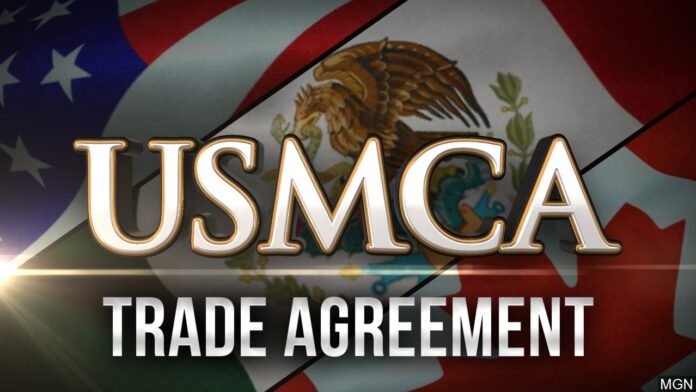It seemed forever in coming, but the U.S-Mexico-Canada Agreement, which replaces the North American Free Trade Agreement, goes into effect Wednesday.
We trust that officials of our three countries remain fully committed to the agreement and the promotion of trade and economic cooperation it represents.
USMCA is a compromise that addresses many issues that have arisen since NAFTA was signed into effect in 1994. As with most compromises, most people are not thrilled about the new pact, but accept it as a reasonable, and necessary, way to deal with changes that have occurred in the global economy, and the three NAFTA countries, in the quarter-century of the old pact’s existence.
The new deal grew from President Trump’s dissatisfaction with existing trade deals. He called it the worst trade agreement he’s ever seen, and originally expressed plans to simply pull out of it, as he did with other deals including the Trans-Pacific Partnership that links Asian and North American countries, including both Canada and Mexico. In the end, the U.S. led negotiations that drafted the USMCA.
It updates several labor and environmental issues, and calls for minimum involvement of each nation’s materials in cross-border assembly contracts. It has new provisions for the international protection of trademarks, patents and intellectual property, to deal with innovations that didn’t even exist when NAFTA was ratified. It strengthens protections for trade secrets, sets new duty-free levels for goods crossing the member countries’ borders and ensures market access to goods and services in all three countries. It also eases restrictions that impeded agricultural businesses’ access to markets in neighboring countries.
Most importantly, the pact carries a sunset clause; it’s set to expire in 2036, which forces the countries to review and revise the deal again or let it die. There’s no telling what innovations and discoveries await us in the coming years, and it’s proper to consider that no deal can be considered permanent.
The USMCA era begins at a challenging time, when the global COVID-19 pandemic has led to the closure or scale-down of several businesses, reducing the amount of capital available for investment as well as interrupting many supply lines. The new provisions will be tested from the outset as furloughed workers start returning to their jobs under the new standards that are part of the USMCA.
We hope the new trade provisions help our three countries rebound from the harsh economic effects of the pandemic. It will be a true test by fire, and either prove the value or expose new flaws in the deal.
We also count on the full compliance and support of all three countries, and continued support for provisions that carry over from NAFTA. We trust the countries will continue to support the North American Development Bank, which has been a key factor in helping build and improve infrastructure that helps make cross-border trade easier and more efficient, and improves the lives of the residents in all three countries.
NAFTA was a boon for our three countries, and especially for the Rio Grande Valley’s economy. We look forward to continued benefits under the new provisions of the USMCA.



